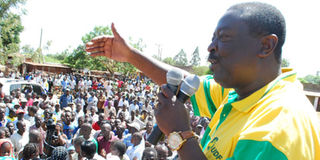Voters burst Musalia ‘kingmaker’ bubble

Amani coalition presidential candidate Musalia Mudavadi addresses a past campaign rally. Photo/FILE
What you need to know:
- Amani leader was expected to give Raila and Uhuru a run for their money but has turned out a political light-weight
- Mudavadi did not only emerge a distant third but also lost his home turf to Odinga in top seat race
Musalia Mudavadi was not only touted as a possible compromise presidential candidate but also a kingmaker if not the king himself.
At one point in the campaign, he assumed a larger than life profile, with President Kibaki assigning him critical State functions.
His handlers went out of their way to project him as the king in waiting— a force of stability in turbulent political environment.
And for months, newspaper editors had a difficult time handling his reported links to State House.
He shocked the country with recent claims that President-elect Uhuru Kenyatta had offered to step down for him.
It was expected that the Amani coalition presidential candidate, who had even secured the endorsement of retired President Daniel Moi, would give the leading candidates a run for their money. Far from it, the results declared yesterday painted a picture of a political lightweight, effectively bursting the kingmaker bubble.
The enduring question was Mr Mudavadi overrated? Why did he perform much below expectation?
Mr Mudavadi did not only emerge a distant third with 429, 000 votes but also lost his home turf to Cord coalition candidate Raila Odinga. Mr Odinga won Mr Mudavadi’s home county of Vihiga and the other Western Province counties of Busia, Kakamega and Bungoma. The Amani coalition got four senators, two of them from Kanu, and a handful of MPs.
Political pundits had reckoned that Mr Mudavadi would be influential in case of a run-off.
However, it became apparent that the former Sabatia MP, who came out as a fringe candidate, had little influence because the results show that he did not command the support of his backyard.
His candidature failed to galvanise the Luhya vote, the way other third forces did in previous years— citing the case in which Mr Simeon Nyachae consolidated the Kisii vote in 2002 despite the presence of Narc and Kanu, while in 2007 Mr Kalonzo Musyoka rallied the Kamba vote behind him despite spirited campaigns by PNU and ODM.
But while conceding defeat on Friday Mr Mudavadi was, however, impressed with the results, saying as a first-timer, it was an indication of better performance in the future.
Mr Mudavadi’s campaign often reacted angrily at suggestions that he was a spoiler in the race as well as State House project.
His poor performance could be attributable to a number of issues.
Operating in an environment in which mobilisation revolves around building of tribal blocs, Mr Mudavadi was unable to attract another significant group outside the Luhyia nation.
Two, his acrimonious exit from Jubilee coalition after Mr Kenyatta challenged him to a contest projected him as a weak man who wants the presidency on a silver platter.
And having cut the impression of a lone ranger, there was a feeling in western Kenya that he stood no chance and a number of supporters saw a vote for him as lost.
It did not help that Kadu leader Cyrus Jirongo launched a fierce campaign in the region, saying a vote for Mr Mudavadi was support for Mr Kenyatta who triggered resentment in western Kenya after the failed power deal.
In the campaign, he made three notable statements.
First, he assured President Kibaki that he will protect him once he retires. Secondly, the Deputy Prime Minister asked his boss Prime Minister Raila Odinga to retire with President Kibaki.
In a dramatic move, Mr Mudavadi, who had accepted to be Jubilee candidate in a secret power deal gone sour, turned out as fierce critic of President-elect Uhuru Kenyatta and his deputy William Ruto who are fighting criminal charges at the ICC.
On the campaign trail, he painted a grim picture of an Uhuru-Ruto government, saying it would attract sanctions that could hurt the economy and isolate Kenya.
He said Kenya needed the international community and criticised those who were claiming that the country could do without Western nations.
According to his spokesman Kibisu Kabatesi, the Amani leader had defined his campaign as one that would stabilise Kenya, provide a conducive environment for investment, creation of jobs, and allow for successful and seamless transition to a devolved government.
He said Mr Mudavadi saw Kenya as one large market. “There is no single moment he considers Kenyans as this or that tribe.”
Well, despite an aggressive campaign Mr Mudavadi did not capture the imagination of the country. It will be interesting to see his next move.




